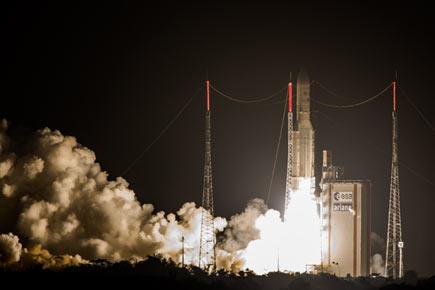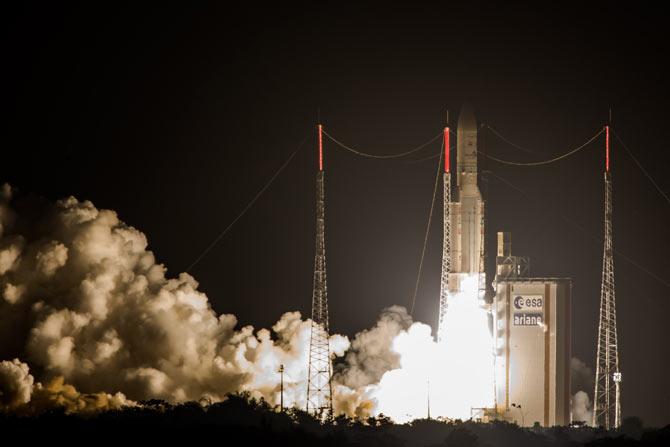Indian telecommunication satellite GSAT-15 was successfully launched on Tuesday evening by European space agency Arianespace's rocket Ariane 5, the space agency said on Wednesday

Chennai: Indian telecommunication satellite GSAT-15 was successfully launched on Tuesday evening by European space agency Arianespace's rocket Ariane 5, the space agency said on Wednesday.
ADVERTISEMENT
In a statement, Arianespace said it had successfully launched two telecommunication satellites - GSAT-15 and Arabsat-6B - for two customers, namely Indian Space Research Organisation (ISRO) and Arabsat.
According to the global satellite launch company, the launch of the two satellites takes the total number of consecutive successful satellite launches to 69 for Ariane rocket. The rocket blasted off with two satellites from the spaceport in French Guiana and completed the mission in around 43 minutes.

The Ariane 5 rocket lifts off from the Ariane Launchpad Area at the European Spaceport in Kourou, in French Guiana, on November 10, 2015. The rocket successfully launched a pair of communications satellites, the ARABSAT-6B (BADR 7) for the saoudian operator Arabsat and the GSAT-15 satellite for the Indian operator Insat. Pic/ AFP
GSAT-15 was the 19th satellite entrusted to Arianespace by ISRO - and the 18th built by ISRO. This productive relationship extends back to 1981 with the launch of the APPLE experimental satellite, and further underscores the strong collaboration France and India have set up in space.
"The launch is ISRO's 19th mission with Arianespace. In the meantime, ISRO also has launched four French spacecraft using (India's own) PSLV," M. Annadurai, director of the ISRO Satellite Centre, was quoted as saying in the statement. With a liftoff mass of approximately 3,160 kg, GSAT-15 is designed to provide telecommunications services as well as dedicated navigation-aid and emergency services across India.
The Indian satellite with a design life of 12 years has 24 Ku-band transponders (automatic receivers and transmitters of radio signals) and two GAGAN (GPS Aided Geo Augmented Navigation) transponders. While the new satellite expected to replace the transponder capacities of older satellites, ISRO is silent on the total number of satellite transponders it has under its fold-owned and leased.
 Subscribe today by clicking the link and stay updated with the latest news!" Click here!
Subscribe today by clicking the link and stay updated with the latest news!" Click here!






